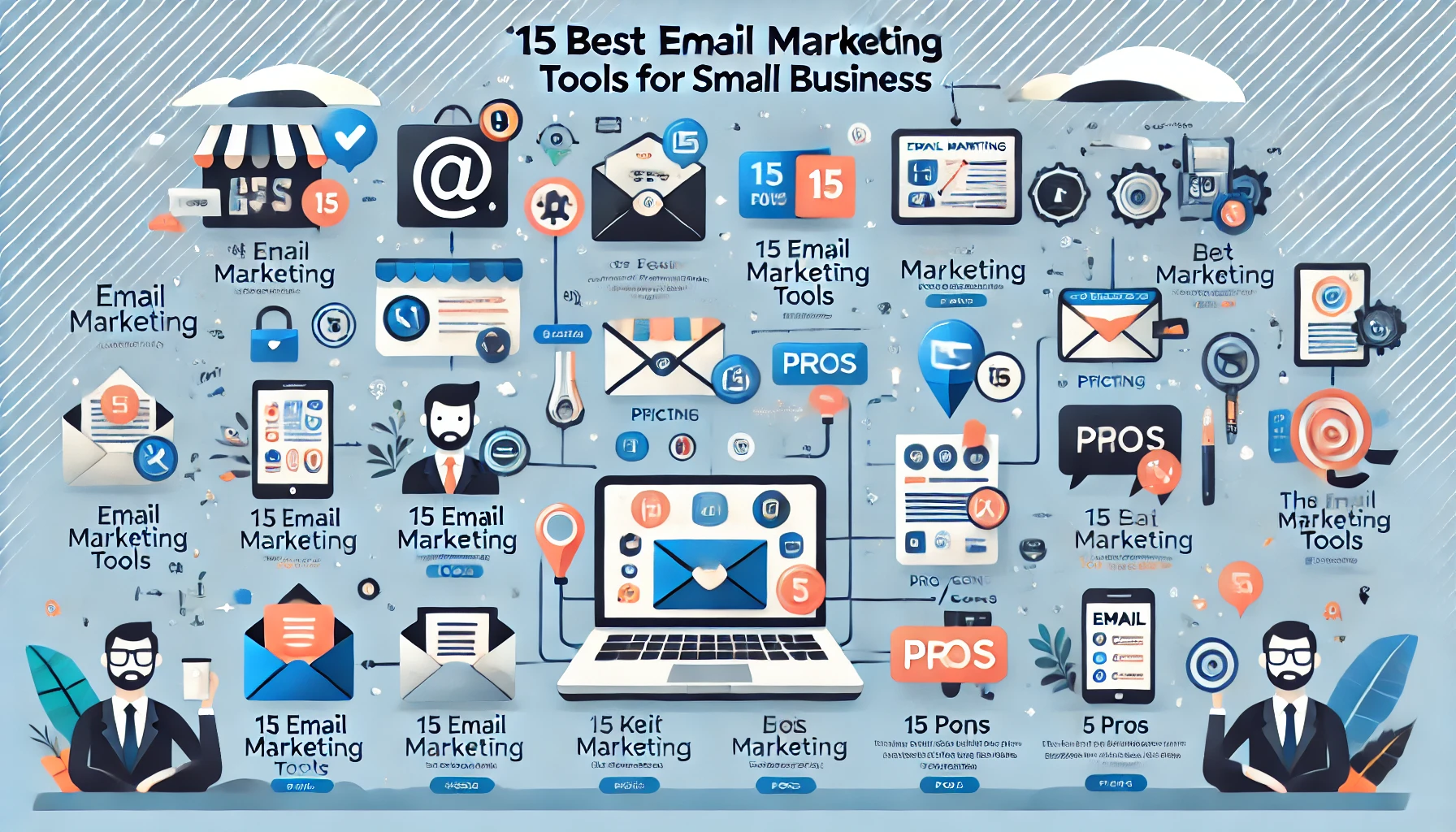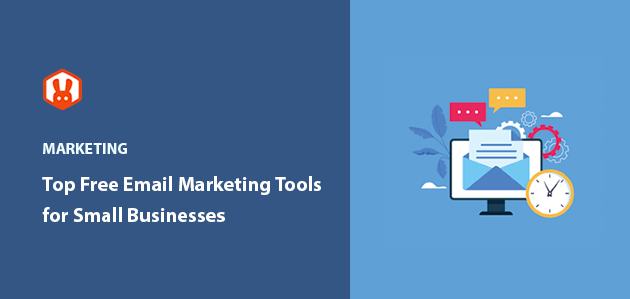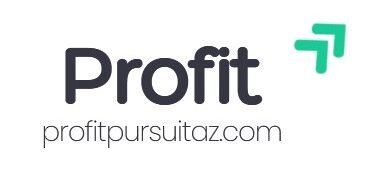Best Email Marketing Tools for Small Business: Top Picks
Email marketing is vital for small businesses. It connects with customers efficiently.
Finding the right tools can boost your business growth. Many small businesses struggle with limited resources. They need cost-effective solutions to reach their audience. Email marketing tools can help. They offer features like automation, analytics, and templates. These tools simplify communication.
They save time and improve engagement. Choosing the best tool can be challenging. There are many options available, each with unique features. It’s essential to pick the one that fits your needs. This blog will guide you through top tools for small businesses. You’ll learn about their benefits and how they can enhance your marketing efforts. Let’s explore the best email marketing tools for your business success.

Credit: medhacloud.com
Introduction To Email Marketing Tools
Email marketing is a key tool for small businesses. It helps reach customers directly. Building relationships with customers is easier this way. Emails are cost-effective and easy to use. They save time and money. Boosting sales becomes simpler. Personal messages make a big impact. They keep customers engaged.
Tracking progress is easy with emails. You can see who opened your message. Understanding what works and what doesn’t helps improve strategies. Small businesses need this insight. Growing a business is hard without email marketing. It’s a smart choice for success.
Email marketing trends keep changing. People love to read short emails. Visual elements like images grab attention. Mobile-friendly emails are crucial. Many people check emails on phones. Automation is popular now. It saves time and effort. Sending emails automatically helps businesses stay connected. Personalization is key. Tailored messages make customers feel special.
Factors To Consider In Email Marketing Tools
Choosing the right email marketing tool involves considering budget, ease of use, and essential features like automation. Ensure compatibility with your existing systems and evaluate customer support quality. Scalability is important to accommodate your business growth.
Budget Constraints
Choosing the right email tool is important. Small businesses often have tight budgets. It’s vital to find a tool that fits the budget. Some tools are costly. Others offer free plans with basic features. Look for tools with flexible pricing. This helps manage costs effectively.
Ease Of Use
A good tool should be easy to use. Many small business owners are not tech experts. A simple interface is helpful. It saves time and effort. Some tools have drag-and-drop features. This makes creating emails easy. Clear instructions and support are crucial. They assist users when needed.
Mailchimp: A Popular Choice
Mailchimp offers robust features for small business email marketing. It simplifies campaign management with user-friendly tools. Customizable templates and analytics help businesses connect effectively with their audience.
Features Overview
Mailchimp is known for its easy-to-use interface. It offers a drag-and-drop builder. This helps in creating emails quickly. Users can access pre-designed templates. These templates make the process even smoother. Mailchimp provides analytics tools. These tools help track email success. Automation features are also available. They save time by sending emails automatically. Segmentation options help target specific groups. This ensures messages reach the right people.
Pricing Options
Mailchimp offers a free plan. This is great for beginners. It allows up to 2,000 contacts. The Essentials plan starts at $9.99 per month. It offers more features. The Standard plan is $14.99 monthly. It includes advanced tools. The Premium plan costs $299 monthly. It is ideal for larger businesses.

Credit: rafflepress.com
Constant Contact: Reliable And User-friendly
Constant Contact is a favorite for small businesses. Its interface is easy to use and friendly. Creating email campaigns is straightforward. Tools help design professional-looking emails fast. You can track results with simple reports. Support is available through chat and calls. This makes resolving issues quick.
Key Benefits
Templates save time and effort. These are customizable with drag-and-drop features. Automated email scheduling is handy. It ensures emails go out at the best time. Users can segment their audience easily. This leads to more personal and targeted emails. Constant Contact also offers social media sharing.
Integration Capabilities
Constant Contact connects well with other software. It integrates with platforms like Shopify and WordPress. This helps manage all marketing tasks in one place. Users can sync their contact lists easily. This makes data management smooth. Such integration boosts productivity.
Getresponse: Advanced Features
GetResponse offers strong automation capabilities for small businesses. It helps save time by automating emails. This tool can send personalized emails based on user actions. For example, it sends a welcome email when someone subscribes. It can also send follow-up emails if users don’t open the first one. This feature ensures customers feel valued.
GetResponse also provides CRM integration. It lets you manage customer relationships easily. Syncing data between your email tool and CRM is simple. This ensures you have up-to-date customer information. It helps keep track of customer interactions and preferences. With CRM integration, you can improve your marketing efforts. GetResponse makes managing customer data easy and efficient.
Convertkit: Tailored For Creatives
ConvertKit offers Visual Automation features. These help in planning email journeys. Drag and drop tools make it easy. You can see the whole process. It’s simple and clear. Changes are quick to make. This saves time. Helps focus on creating content.
Managing subscribers is easy with ConvertKit. You can add and remove them quickly. Tags help in organizing the list. Grouping by interest is possible. This personalizes emails better. Keep track of user actions. It enhances email targeting. This boosts engagement.
Benchmark Email: Simplified Approach
Benchmark Email offers easy-to-use templates. These help in creating emails fast. Choose from many designs. Each design is ready for use. Customization is simple. Adjust colors and fonts as needed. Add your own logo. Make emails look professional. Personalization tools are available. Send messages that connect with your audience.
Analytics tools are included. These track email performance. See open rates and click rates. Understand what works best. Reports are clear and easy to read. They show important data. Use this data to improve your strategy. Make better decisions for future emails. Stay informed with real-time updates. Always know how your emails are doing.
Choosing The Right Tool For Your Business
Small businesses have different email marketing needs. Some need easy-to-use platforms. Others need more advanced features. It’s important to know what your business needs. Begin by listing your goals. Do you want to grow your contact list? Or maybe you want to track email open rates? Understanding these needs helps in making the right choice. Also, consider your budget. Some tools cost more but offer great features. Others are free but have limits. Choose wisely.
Think about how your business will grow. You might start small, but plan for more subscribers. Choose tools that can handle increased subscribers. Some platforms offer scalable plans. This means you can upgrade as you grow. Check if the tool offers good customer support. As your business grows, you might need help. A tool with reliable support is a smart choice. Always think about future needs, not just current ones.
Conclusion And Recommendations
Choosing the best email marketing tools boosts small business growth. Opt for user-friendly platforms with automation features. Evaluate analytics capabilities to refine campaigns and maximize engagement.
Summary Of Top Picks
Mailchimp is great for beginners. It offers easy templates. Constant Contact provides solid customer support. It has useful tools for small teams. SendinBlue is perfect for budget-friendly plans. It includes SMS marketing. AWeber is known for good auto-response features. It supports small businesses well. GetResponse has strong automation features. It offers webinars too.
Final Thoughts
Choose based on your needs. Some tools are better for large lists. Others focus on design or automation. It’s important to test different options. Find what fits your business best. Keep it simple. Start with one tool. Grow as you learn. Budget matters, but so does the tool’s ease. Make sure it works well for your team.

Credit: saufter.io
Conclusion
Choosing the right email marketing tool can boost your small business. These tools help reach your audience effectively. They offer features like automation, analytics, and personalization. Start with a trial to find what fits your needs. Ensure it aligns with your business goals.
Explore different options and compare their features. With the right tool, you can enhance communication and grow your business. Stay updated with new trends and features. Email marketing remains an essential strategy for success. Invest time to learn and adapt.
Your business can thrive with thoughtful email marketing.
